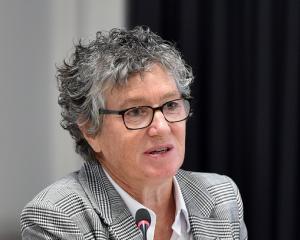The feasibility of reinstating a groyne at St Clair Beach will be investigated by the Dunedin City Council.
The council voted 11-4 this afternoon to request an urgent report into costs and timeframes of re-establishing a groyne, potentially on a trial basis.
Groynes have been used, on and off, at the beach since early in the 20th century, as part of efforts to retain sand.
The last remains of a line of poles, the remnants of a groyne, disappeared from view in July this year.
New Dunedin Mayor Jules Radich has been a consistent advocate for their restoration, arguing they should help build up the beach and could delay expensive work that might need to be done to fight erosion.
Some scientists have argued the beach at St Clair is the wrong type of environment for a groyne to be effective.
The remains of the 1921 groyne at St Clair, with the sea lion sculpture of ''Mum'' in the foreground. The poles have since disappeared, Photo: Stephen Jaquiery
At today's meeting, Mr Radich again pointed to the historical record, which seemed to show groynes had been effective in the past.
He also said the performance of sand sausages, which had cost more than $2 million, had been disappointing.
It is expected the council report will collate opinions, reports from experts and provide up-to-date costings. The merits of reinstating the poles might then be debated more fully.
"Various pros and cons can be argued at this stage," Mr Radich said.
Cr Lee Vandervis was in favour of the experiment.
A groyne would have amenity value, even it turned out not to be successful in retaining sand, he said.
Cr Andrew Whiley said it was well known in the community before the election Mr Radich had wanted a groyne reinstated at St Clair.
"We owe it to the community to consider it."
The councillors who voted against were David Benson-Pope, Christine Garey, Marie Laufiso and Steve Walker.
Cr Benson-Pope signalled obtaining consent from the Otago Regional Council could pose a problem.
The council had also approved a management plan in February for the coast from St Clair to St Kilda and this had cost more than $700,000 to develop.
That seemed a better basis for decision-making than "this idea might work, so let's give it a try".
Cr Walker asked how much money was too much for an experiment.
Cr Garey said scientific evidence for the benefit of such a project was lacking.
Kevin Gilbert and Bill Acklin were two councillors who lamented lack of action that had been taken in recent years.
Cr Jim O'Malley said experts were not infallible.
Groynes had worked at the beach previously and might again, although damming of the Clutha River was one factor that raised some uncertainty.
More than 4600 people have signed a petition calling for the poles to be reinstated.












